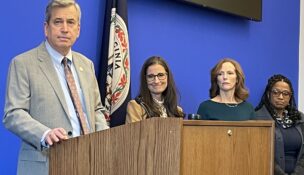Virginia State Bar applauds expansion of emeritus bar eligibility

Depositphotos.com

Depositphotos.com
Virginia State Bar applauds expansion of emeritus bar eligibility
In brief
- Amendments loosen emeritus bar requirements
- Rule change aims to close justice gap in legal desert regions
- Supreme Court of Virginia approved amendment on May 16
- Retired attorneys now eligible to offer vital pro bono services
As the legal profession faces challenges due to emerging “legal deserts,” lower income Virginians are among the most impacted by a lack of affordable or available counsel.
“The need for pro bono services is enormous,” Chantilly attorney Scott Reid said. “Legal aid societies and private bar assistance are not enough to close the low-income justice gap, especially in Virginia’s ‘legal deserts’ where they may not even be one attorney for every thousand residents.”
It was with that potential shortfall in mind that the Virginia State Bar Access to Legal Services Committee, chaired by Reid, proposed amending the Rules of the Supreme Court of Virginia on emeritus class membership to the bar.
The amendments to Paragraph 3, Part Six, Section IV of the Rules of Court, which went into effect July 15, expand the eligibility criteria for emeritus membership to the VSB by eliminating the requirement for recent active practice and reducing the duration of required active practice to 10 years, down from 20.
John Whitfield, executive director of Blue Ridge Legal Services, said the changes to the emeritus class rule are a positive for pro bono and legal aid practitioners.
“I think the relaxations of the requirements were smart and will open the doors up to people who would be fully qualified to do this kind of pro bono work, and were unnecessarily being left out,” Whitfield said.
University of Richmond School of Law Professor Tara Casey, who is a member of the VSB Access to Legal Services Committee, said she is “very heartened by the Supreme Court of Virginia’s adoption of the amendments to the emeritus rule.”
“We look forward to welcoming more attorneys to these opportunities as their engagement is so beneficial to our communities in need, as well as the overall health of the profession,” Casey said.
Petition process
The VSB petitioned the Supreme Court of Virginia for the rule change following a unanimous vote of the VSB Council on March 1. The proposal came before the council following a request from the VSB Access to Legal Services Committee.
“The Access to Legal Services Committee proposed expanding and incentivizing emeritus class membership to create more opportunity for pro bono service from a largely untapped talent pool,” Reid said.
In the petition to the court, the VSB noted that the rule “provides a structured and inclusive framework for emeritus membership that enhances access to legal services… and strengthens the pro bono community in Virginia in a fashion that supports and complements the rich regional network of existing service providers.
If we’re going to have a system that requires lawyers, then we need to make sure that people who can’t afford a lawyer still have access to a lawyer.
— John Whitfield, Blue Ridge Legal Services
“This initiative supports efforts to close the justice gap for low-income and underserved populations while maintaining high professional standards,” the VSB said in its petition.
The bar also highlighted in its petition that the amendments bring Virginia “in line with national trends.” Per the VSB, 46 states and territories have an emeritus pro bono practice rule, with the majority having less restrictive criteria than the Virginia rule before the July 15 amendment.
Notably, only five jurisdictions required recent active practice, which Virginia eliminated under the amended rule, and 34 jurisdictions did not have a practice duration requirement.
“It seemed like reducing [the active practice requirement] from 20 years to 10 was a good, reasonable thing to do,” Whitfield said. “If someone’s had 10 years of practice and they are going to be retiring and want to volunteer for legal aid work, 10 years of practice is plenty, so why keep them from doing that kind of pro bono work?”
The Supreme Court of Virginia approved the VSB’s petition to amend the Rules of Court on May 16.
“The committee thanks the VSB leadership and bar council for supporting the proposed amendment and the Supreme Court of Virginia for making this needed change,” Reid said.
Closing the justice gap
Whitfield, who has worked in legal aid for his entire career, said the need for pro bono work continues to persist.
“Legal aids are so overwhelmed by people who are desperate for legal assistance, and we just cannot meet the need,” Whitfield said. “It’s heartbreaking to tell somebody that you can’t help them, they may have a good case but they’re not going to be successful because they don’t have a lawyer.”
These attorneys not only possess tremendous skills and expertise, they also possess the ability to mentor and guide future generations of lawyers.
— Tara Casey, University of Richmond
Whitfield noted that having an attorney doubles a person’s chance of being successful, adding that in the court system, “if you can’t afford a lawyer, and you go into court without a lawyer, you’re really lost.”
“I think the legal profession, the legal system, owes it to people who can’t afford a lawyer to try to fix that justice gap that we’ve created,” Whitfield said. “If we’re going to have a system that requires lawyers, then we need to make sure that people who can’t afford a lawyer still have access to a lawyer.”
Casey, who is director of the Carrico Center for Pro Bono & Public Service, said emeritus class attorneys have also benefited her law students.
“These attorneys not only possess tremendous skills and expertise, they also possess the ability to mentor and guide future generations of lawyers as they chart their own paths in balancing service and practice,” Casey said. “Our law students in particular gain so much from these interactions – whether it is volunteering at a pro bono wills clinic or working together on an uncontested divorce.”
The emeritus class of lawyers was first created in 2010 and currently has 34 members, according to Reid. However, Reid said that under the expanded rules, more emeritus class attorneys can make a tangible impact.
“With incredible skillsets and at least a decade of active practice, emeritus lawyers can have a life-changing impact on people’s lives while taking on a new range of interesting legal issues and maintaining links with former colleagues,” Reid said.
Whitfield highlighted the efforts of emeritus class attorney Charlie Phillips, who works at the Roanoke office of Blue Ridge Legal Services. Phillips retired after a half-century practicing law and became an emeritus class attorney.
Now well into his 80’s, Whitfield said Phillips, who comes into the BRLS Roanoke office daily, is among the most productive members of the staff.
“He has opened the door to hundreds of people, opened the door to justice for hundreds of people in the Roanoke Valley,” Whitfield said. “So, it is wonderful to be able to tap people who have that kind of experience, that kind of burning desire for justice, who want to give back after they’ve retired.”
Whitfield added that one attorney had reached out prior to the rule change but didn’t qualify under the old rules for emeritus status.
“I’m not sure if he’s still interested, but I’m going to track him down and see if he wants to try it again now,” Whitfield said.
-


 If we’re going to have a system that requires lawyers, then we need to make sure that people who can’t afford a lawyer still have access to a lawyer.
If we’re going to have a system that requires lawyers, then we need to make sure that people who can’t afford a lawyer still have access to a lawyer. These attorneys not only possess tremendous skills and expertise, they also possess the ability to mentor and guide future generations of lawyers.
These attorneys not only possess tremendous skills and expertise, they also possess the ability to mentor and guide future generations of lawyers.














